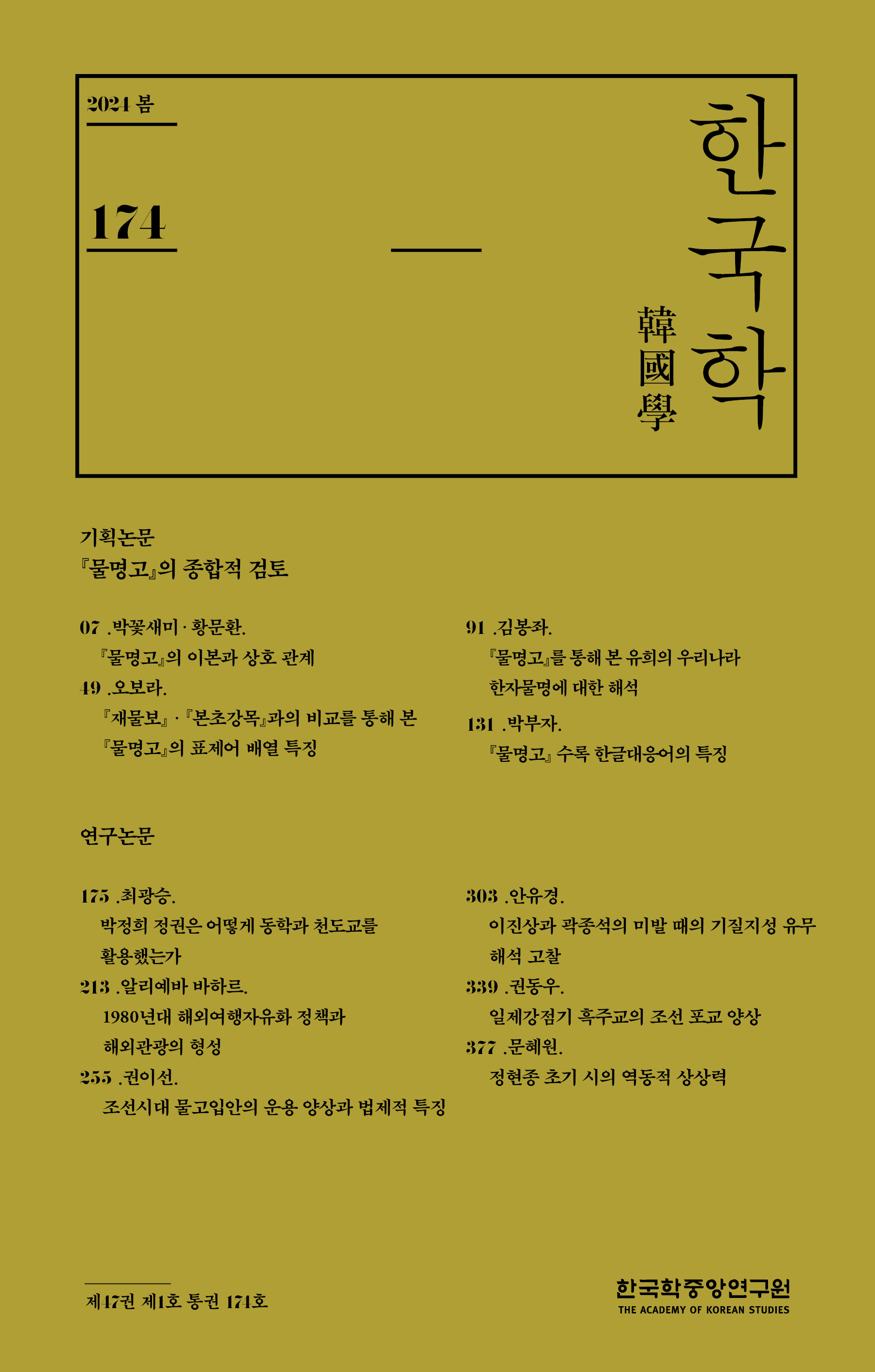
- P-ISSN 2671-8197
- E-ISSN 2733-936X
.jpg)
The purpose of this article is to examine the fundamental reason that socialism could be flourishing like a fashion in the early 1920 of the Joseon Dynasty period, from the viewpoint of the advent of the inside. The failure of the Samil Undong and the continuous political negligence of Western powers about Joseon caused the intellectual of the colony to make them pay attention to their own happiness. In the early 1920s, happiness discourses were rapidly increasing, which was a restructuring course of individual position. The intellectual borrowed various theses and concepts for personal happiness. Of those, this article was to investigate how the concept of labor could share with discussion of bourgeois and social discussion and what difference it made between the two ideologies. In this context, it was ascertained that bourgeois’ discussion of happiness tried to control individual’s inside based on ‘moralism’ for development of the society and the nation, and discussion of social happiness underlined ‘ethics’ and accepted ‘socialism’ as knowledge of selfreflection. A process to find out socialism not from the ideological standpoint but from the spiritual viewpoint does not deny ideological characteristics of socialism but examines opportunities having a great influence on the people. At this point of view, although it is discussion limited to the early 1920s, the advent of socialism and the ethnical inside awaits the active discussion. This article is only the first step for that.
《동아일보》,《매일신보》,《조선일보》,《개벽》,《공제》,《백조》,《신생활》,《폐허이후》.
가라타니 고진 저, 송태욱 역, 윤리21 . 사회평론, 2001.
가라타니 고진 저, 트랜스크리틱 . 한길사, 2005.
권보드래, 「진화론의 갱생, 인류의 탄생‒1910년대 인식론적 전환과 3ㆍ1운동」. 대동문화 연구 66, 2009, 223‒253쪽.
김정인, 「1920년대 전반기 민족담론의 전개와 좌우투쟁」. 역사와 현실 39권, 2001, 232‒259쪽.
김택호, 한국 근대 아나키즘문학, 낯선 저항 . 월인, 2009.
대리 맥마흔 저, 윤인숙 역, 행복의 역사 . 살림, 2008.
박명규, 「1920년대 ‘사회’ 인식과 개인주의」. 한국사회사상사연구 , 나남출판, 2003.
박종린, 「일제하 사회주의사상의 수용에 관한 연구」. 연세대학교 박사학위논문, 2006.
박찬승, 한국근대정치사상사연구 . 역사비평사, 1992.
소영현, 「아나키즘과 1920년대 문화지리학」. 한국문학의 연구 36, 2008, 345‒375쪽.
윤병로 편, 박종화의 삶과 문학 . 성균관대학교 출판부, 1992.
이경돈, 「잡지「근화」와 문학동인지시대」. 반교어문연구 26, 2009, 351‒373쪽.
이종호, 「일제시대 아나키즘 문학형성 연구」. 성균관대학교 석사학위논문, 2005.
이태훈, 「1920년대 전반기 일제의 ‘문화정치’와 부르주아 정치세력의 대응」. 역사와 현실 47권, 2003, 3‒35쪽.
이혜령, 「1920년대 동인지 문학의 성격과 여성인식의 관련성」. 1920년대 동인지 문학과 근대성 연구 , 깊은샘, 2000.
이호룡, 한국의 아나키즘 . 지식산업사, 2001.
이현주, 한국 사회주의 세력의 형성 . 일조각, 2003.
임경석, 한국 사회주의의 기원 . 역사비평사, 2003.
임경석, 「3ㆍ1운동 전후 한국 민족주의의 변화」. 역사문제연구 4호, 2000, 79‒100쪽.
전명혁, 1920년대 한국 사회주의 운동연구 . 선인, 2006.
전상숙, 「사회주의 수용 양태를 통해 본 일제시기 사회주의 운동의 재고찰」. 동양정치사상사 제4권 제1호, 2003, 155‒171쪽.
전상숙, 한국 사회주의 지식인 연구 . 지식산업사, 2004.
정우택, 황석우 연구 . 박이정, 2008.
정우택, 「《문우》에서《백조》까지 ‒ 매체와 인적 네트워크를 중심으로」. 국제어문 47집, 2009, 35‒65쪽.
조영복, 1920년대 초기 시의 이념과 미학 . 소명출판, 2004.
최원식, 「프로문학과 프로문학 이후」. 민족문학사연구 21호, 2002, 10‒33쪽.
페터 쇠틀러 저, 나종석 역, 일상사란 무엇인가 . 청년사, 2002.
한기형, 「초기 염상섭의 아나키즘 수용과 탈식민적 태도」. 한민족어문학 43, 2003, 73‒105쪽.
한나 아렌트 저, 이진우ㆍ태정호 역, 인간의 조건 . 한길사, 2008.
허민, 「1920‒30년대 ‘사회주의 연애’ 담론과 프로소설의 재현 양상 연구」. 성균관대학교 석사학위논문, 2009.